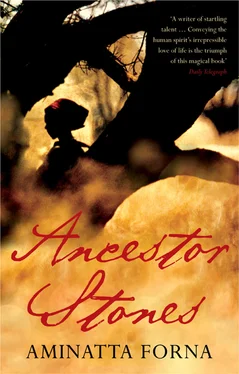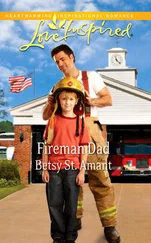But then they would be singing. And they definitely are not singing. And nobody is improvising steps or clicking their fingers. The sound of their voices falls somewhere between a shout and a murmur.
The crowd slows. A short distance from our own house now. We are nearly home.
And now they are upon it.
They stop. In front of our house.
In front of our own house.
And we stop too.
And the first thing I feel is guilty. Guilty. A mental checklist of offences committed and undetected. As though the appearance of dozens of people in the dead of night might be something we have brought upon ourselves. For practising swear words when we are alone. For holding spitting competitions. For someone’s doves we accidentally set free; they flew up into the branches of an orange tree and broadcast their freedom with thunderous coos. We didn’t try to catch them. We ran away.
Then she is there standing in the frame of the door, struggling to make herself decent. Eyes small with sleep, bare shoulders luminous in the moonlight. When they see her the crowd quiets and lets one do the talking. And we stand still, trying to catch the words that flutter past like dark moths. And then we see all of them, our mother now among them. She is at the head of the crowd, but she is not leading them. Nobody lays a hand on her. I sense the invisible will that propels her forward. They move away down the street. And we run for the safety of our own house and our own beds because we know — we just know — that this is something of which we should not be part.
And he wasn’t with them. I’m sure of it. Maybe he was hiding. Or had fled before he was brought in front of the court. Those people were his supporters, come to clear his name.
The sequence of things is difficult. But that must surely have come first. The people from the village came to beg. They had come to plead. But running beneath the words, the forms of deference: an insistence. They would be heard. My father would hear them. An insistence, not yet a defiance.
That’s all I remember of that time.
Then came the court case.
The boy who was under the table was Soulay, younger son of Ya Koloneh. That was how it worked in those days. I mean, there are different ways of learning. You had to observe the way things were done. The boys who were chosen learned at the feet of the elders.
The elders met in the barrit . It was in the middle of the village right next to the well, where the women met. A round building with a tall, conical, thatch roof the shape of a witch’s hat, open sided so that people going about their tasks could stop by at any time to hear what village business was being discussed there by the elders.
Whenever something important was happening we children would try to see inside. Sometimes we managed to shove our faces in between the elbows of men sitting on the periphery wall. Most times they drove us away, swatting us like flies with a long switch.
I remember playing this game. Even when it was my own mother who had been shamed and brought before the elders.
Soulay was older. He had a way about him, I remember. A way of holding his head so that it rocked back on his skinny shoulders. He used to hunch them up around his chin, so his head looked like an egg in an egg cup. His smile occupied the entire lower half of his face and showed all his teeth at once. And he could pop his cheeks louder than anyone. And spit the farthest. And once a line of ducklings followed him around for weeks, thinking he was their mother.
We met at the karanthe behind the mosque, feverish with curiosity. Nothing this exciting had happened since Salifu Kamara got stuck up the breadfruit tree. He’d climbed up with a long stick to get at the fruit. I don’t know, but somehow he dislocated his shoulder. Everyone heard him hollering. The men ran and fetched a fishing net, urged him to leap. It took ages for him to work up the courage. Each time he seemed about to go he’d stop, shout down more instructions. To the right. To the left.
When he did jump the net wasn’t taut enough. Pa Kamara slammed into the ground with such a thud the earth trembled. He broke his leg. They carried him away in the net all the way to the Kroo bone-setter in Mabass.
For ages afterwards we played that game with an old lappa : Pa Kamara jumping from the breadfruit tree.
That day in the karanthe we were as eager as the other children to hear Soulay tell his story. It makes me ashamed now to think about it. I didn’t understand, I didn’t understand the consequences — for her, for Yaya, for me.
She does not call his name. She denies she is faithless. And yet, when they bring out a powerful sassa , one from the village of the accused man — she falters.
We don’t care about the accusations. We don’t understand them anyway. It is the gory details we crave. What did the sassa look like? We want hair, horns, hoofs. And there must be something red in colour we can tell ourselves is blood. Sacrificial blood. Palm oil or betel nut. Dead things and red things.
Soulay enacts my mother’s terror for us, shivering and quivering as she backed away. We watch him with glassy eyes, breathing hotly through open mouths. No shuffling. No sniffing. No nose picking or scab scratching. And afterwards we ponder the information with delighted disgust and sated bloodlust.
She refused to call the man’s name.
Now she claims her confession was falsely given. The elders looked at each other and around. One peered through empty spectacle frames. Another swatted himself with an animal tail, encased at the anus point in an ivory handle. Together they looked down at her — this woman neck deep in woman trouble. How could it be so?
An afternoon, when the new house was nearly completed, my father called her and told her he wanted to bathe. She replied she would fetch water. But he shook his head. No, he said, down to the river. The two of them, together. Her husband never bathed in the stream. That was the place for children and unmarried men, men without wives and daughters.
It was the hour before darkness. The river was quiet. She agreed to his request. What else to do? In the water he stretched out, swimming off into the deep. He called to her to follow. She was nervous; reassured by his voice. A game, perhaps? His manner suggested playfulness and appealed to the part of her that was curious and eager as one who had never been favoured.
Imagine her:
Fingers pull at the sodden knot of her lappa , she lets it unwind and float on the surface of the water.
At first she thinks little of the firmness of his grip, the finger digging into the flesh of her arms. Her nervousness, the current. Together they swim to the other side, far from the houses. A tenth wife. Alone with this man, who is her husband. Confused. Growing less hopeful that this behaviour is the manifestation of a sudden ardour.
Can’t swim. Naked. And in deep water. Points her toes downwards like a dancer — and still can’t feel the bottom. Just reeds tickling her toes like a water spirit’s fingers. A leaping in her guts, panic straining to be freed. And only his grip — painful on her upper arm — keeps her from taking in gulps of water. Meanwhile darkness steals across the water.
Imagine him:
A husband who feels his age. Righteous, yes. Indignant, somewhat. He wishes he’d never been told the rumours. If she had been one of the more senior wives, and discreet, the other wives might have made arrangements. Now it was already too late. And there was the man himself to consider. It went beyond what was obvious.
And so he pulls her out of sight into the darkness under the mangroves. He confronts her with what he knows, repeats the talk. She had been seen. They had been overheard. And he demands a confession, there and then. And she, with her toes pointed down and her chin tilted up, grabbing breaths as fast as she can. She confesses.
Читать дальше












